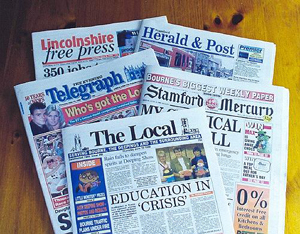Rumours of trouble at the San Francisco Chronicle (which came from Tim O’Reilly originally) have sparked much commentary, some of it insightful — and here I have to mention Dave Winer, whom I have had differences with in the past but who makes some worthwhile points about what papers need to do — and some of it, well, not so much. Like my friend Mark Evans, who has a long post here, I think Robert Scoble falls into the not-so-much category with his post about how newspapers are dead.
 Are newspapers in trouble? Sure they are. And I would definitely agree that there hasn’t been enough thinking about (or investment in) the future from many newspapers, although I would argue that the Globe and Mail has been doing more than some of its competitors. But I don’t think it advances the debate any to throw around apocalyptic pronouncements — and I say that knowing full well that many people will discount what I’m saying because I work for a provider of dead-tree media.
Are newspapers in trouble? Sure they are. And I would definitely agree that there hasn’t been enough thinking about (or investment in) the future from many newspapers, although I would argue that the Globe and Mail has been doing more than some of its competitors. But I don’t think it advances the debate any to throw around apocalyptic pronouncements — and I say that knowing full well that many people will discount what I’m saying because I work for a provider of dead-tree media.
Obviously, more people like Robert Scoble are getting their news from the Web — as am I, and other geek types. As Mark points out, however, plenty of people are also getting their news from free papers, which have been growing at an incredible rate. That definitely means trouble for the newspaper industry’s current business models, but not necessarily for print itself. But there are still hundreds of millions of people subscribing to newspapers, and likely will be for decades, even if that number decreases.
To me, part of the problem is that everyone focuses on the “paper” part of the word “newspaper,” which to me is the least important part of the term. There’s no question that the paper part of the business is decreasing in importance, and news may no longer be primarily distributed on smashed-up trees. Does that change the nature of the business? Definitely.
But it doesn’t mean newspaper companies have to die — it just means they need to evolve.
Further reading:
Doc Searls has some ideas about how to do that. Mike Arrington has some thoughts about journalism at CrunchNotes. Karoli at Odd Time Signatures has a few thoughts about the evolution as well (love the new blog design, Karoli). My friend Scott Karp has a long and typically insightful look at the paper business here. And Steven Hodson at Winextra notes that the equation is a little different for small-town or local papers, which I think is an important point.
